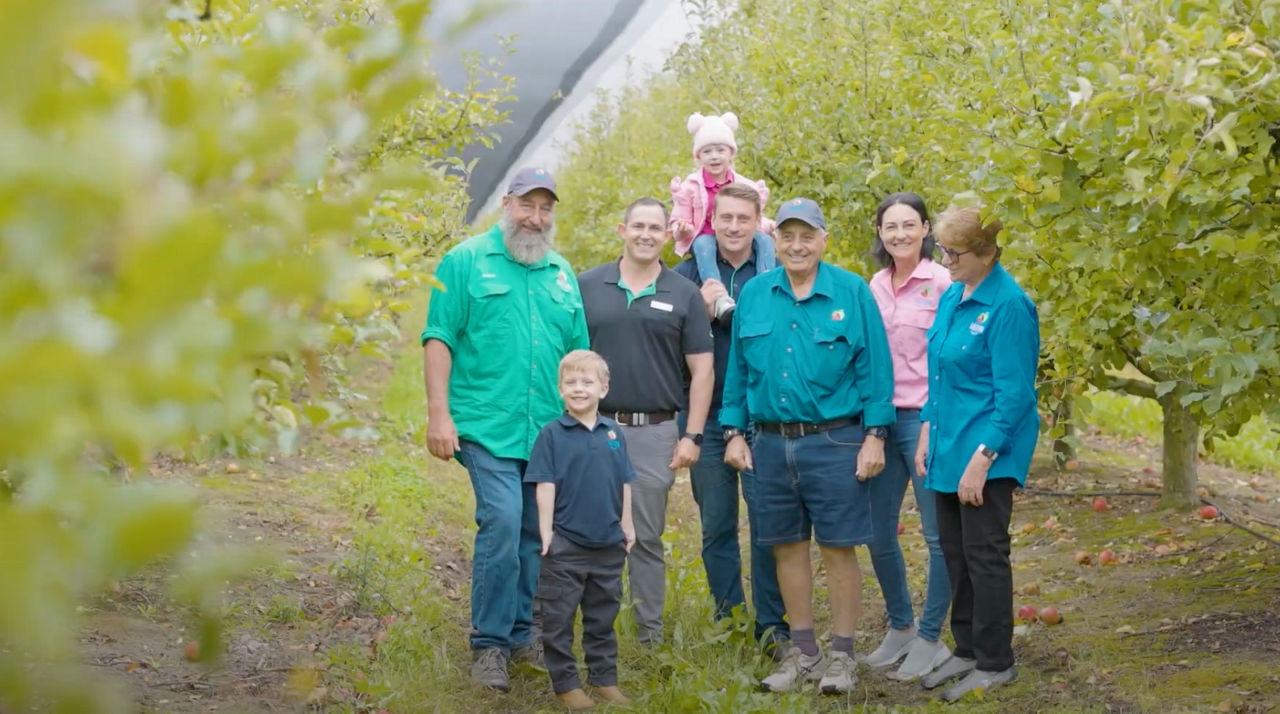The Baronio family of Queensland’s Eastern Colour farm, one of Woolworths Group’s long-time direct suppliers, first partnered with us in 1988. To celebrate this successful 36-year partnership, we visited founders John and Louisa Baronio, sons Nathan and Stephen, daughter Karen and grandchildren at the family’s Applethorpe property in Queensland to talk about the longevity of the relationship with Woolworths, their diversification into strawberries, and the future of their family farm.





























Growing together for 36 years
8 min read






























John, you’ve been supplying directly to Woolworths since 1988. Can you share how this 36-year partnership came to be?
John: I’d like to think we were fairly good growers before the partnership. We were always doing our best. We pushed to make our product as good as possible and I have no doubt [Woolworths] were buying it on the open market. They knew about us and some contact was made through a friend of mine in Gatton, who was supplying broccoli at the time.
 John Baronio and his grandson Archie
John Baronio and his grandson Archie
I hesitated, initially, to go with Woolworths as I didn't want to push in front of one of my best friends. But then, after a couple of years, we worked out our season was predominantly summer because we had cool summers, which is very unique for Queensland. Stanthorpe is the only place in Queensland that has a Victorian climate.
The broccoli grew well because it was cooler than Gatton, which was stinking hot, so my friend couldn't grow them and therefore we weren’t in competition.
Supplying to Woolworths was a new idea and you had to feel your way. This thing didn’t go ‘bang’ and was a massive success from the first day. It started off slowly and got bigger and better and bigger and bigger to what it is today.
Nathan: We wouldn't be in farming today if Dad hadn't started his relationship with Woolworths back in the ’80s.
What were some of the challenges you faced as you felt your way into this partnership?
John: We [the Woolworths buyers and Baronio family] both learnt how to do business together. One of the principles that I believed in, stuck by and agreed with the boys was that if there is an issue or problem, we’d talk about it. We’d negotiate and sort it out over coffee at the table.
We both agreed to treat each other like partners. That's how my line of thought was and I am sure it was for Woolworths, too.
To this day – and my boys are doing it now – my ideology is that we are partners. We treat each other like partners and are good and fair to each other.
We went into our relationship with Woolies wanting it to be fair and well balanced. If you have issues, you have to be able to talk about it and solve it. We’ve always done that and I think it’s been a really good success. It really, really has.
You didn’t originally grow broccoli but had to completely pivot after the devastating hail storm in 1985, right?
John: We had a lovely apple farm here, which we’d bought. I had the best apple crop I’ve ever seen in my life. Then, 24 hours before our picking date, we got blown off the face of the earth. Totally demised.
Louisa and I had bills to pay and had a farm to run. We thought, “How are we going to pay our bills?”
We didn't make a straight transition to broccoli, though. We decided to plant one acre a week and try broccoli. When they started coming in every week, we’d cut the acre and go onto the next acre. We had eight lots and it worked amazingly.
We called it program planting, a term that wasn’t used at the time, and Woolworths loved that because it means you have produce all the time.
Our methodology was friendly to Woolworths’ needs. That was before we went direct. The system was in place.
 Stephen Baronio and Blue
Stephen Baronio and Blue
When did you introduce strawberries?
Nathan: We went into strawberries 10 years ago and Woolworths backed us to grow a new line.
Together, we deliver beautiful strawberries and apples every day to stores all around Queensland.
The team at Woolworths has always provided great support through information and insights, so that we can continue to deliver the best possible product. We can't do what we do without Woolworths Group.
You’re the biggest strawberry producer in the region, right?
John: Oh, yeah, by far. We grow around 2 million plants per season.
Woolworths were immediately open to the new idea of strawberries?
John: Woolies has always been there for us – always. I have to give them 10 out of 10 for their support.
Nathan: We initially went down to see one of the senior fruit buyers at Woolworths back in 2013. Dad went down to pitch strawberries to them.
John: Yes. I presented our commitment, our case, and they believed in us and away we went.
Nathan: It’s pretty unique for Woolworths to take us on as strawberry suppliers and say, “Okay, we’re going to let you grow something for us you’ve never seen before”.
Do you think it's your passion and meticulous attention to detail that contributes to the success of our partnership?
Nathan: Whenever buyers have come and spoken to us, they always say they love coming here because we have a lot of passion and love for what we do. Dad and Mum taught us to get in there, do the work with everyone, lead by example and love what we’re doing.
We’re not perfect and we’re not the greatest farm in the world, but every day we’ll go out there and try our hearts out to do the best job possible.
If mistakes happen, we work with Woolies to do the best job every single day. Sometimes the quality is going to be immaculate and sometimes it isn’t going to be there, but we always work with Woolies to try to mitigate any losses.
Like the Odd Bunch line?
Nathan: Yes, the Odd Bunch line has been tremendous for us in regards to our imperfect apples and strawberries. We’re seeing less and less waste every single year because we’re selling more and more kilos, and that’s what it’s all about.
We talk about sustainability in terms of inputs but I like to look at sustainability as well as selling as much as possible. If you’re growing something that’s going to be fed to the cows, well, that’s not as good as growing something that’s going to be sold. This way, you can cut off [a little bit off] the strawberry and you’ve got a beautiful part of your pavlova.
 Nathan and John Baronio
Nathan and John Baronio
Do you know how much waste has been mitigated?
Nathan: There is a pretty strong secondary apple market in Brisbane, but there was nothing for strawberries. I would easily say that through the Odd Bunch line, we’ve saved 220,000 kilos of strawberries from waste. It’s a big line.
It’s really good at times like this. In the shoulders, strawberries are very inconsistent so the price gets quite high. The demand for the Odd Bunch line as a good quality and high-value product is fantastic.
What is the best piece of advice your father has given you for taking the farm and the partnership with Woolies into the next 36 years and beyond?
Nathan: That I’m no better than any of the team picking out there, so I may as well go out and pick with them and lead by example.
I’ve always seen my dad work beside everyone. No job is too good for us and you can’t expect everyone to go do the jobs that you don’t want to do.
John, how does it feel to have your sons continue your legacy?
John: It’s immensely satisfying. It’s very hard to put into words.
They are both very smart. They know what they are doing. They are always aiming high and striving to do the best they can. They use a heck of a lot of science, which wasn’t always available in my day.
What’s your future vision for Eastern Colour?
Nathan: It’s been a pretty hectic 10 years.
What we’ve achieved in the past decade with strawberries is pretty outstanding! To go from not growing a plant to growing 2.2 million underprotected crop substrates with state-of-the-art irrigation systems – and building a workforce around it – has been amazing.
The job isn’t done yet but at the end of the day, I like to keep things simple. We’re growing strawberries, not building rocket ships. We want to continue to grow an awesome product, pack it right, send it away and know that people are going to enjoy it.
We’re never afraid to look and say we can do it better. Sometimes choosing not to expand means you can focus on what you’re doing a little bit more, refine the process and get better and better. As long as you’re always progressing in some way, that is good.































